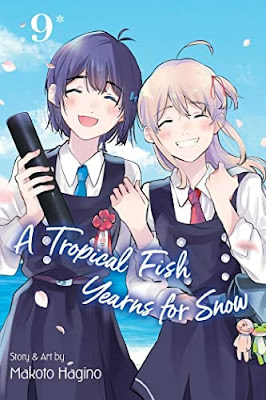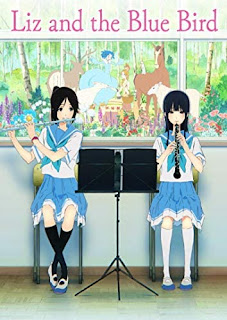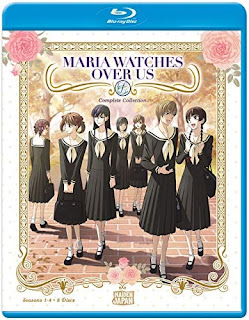Quick synopsis: Konatsu Amano moves in with her aunt in a small seaside town when her dad goes overseas to work (we get hints that the mom has passed away). On her first day at school she meets Koyuki Honami, a senior, and sole member of the school's aquarium club. They connect and start a deep friendship.
SPOILER WARNING: I will be talking about the overall emotional arc and "ending(?)" to this series. So if you don't want spoilers, don't read any further.
Last chance? Okay, still reading?
Here's what I hate in recent "yuri" (I hesitate to call this series yuri, but whatever, that's for another rant): I hate when a story is too weak kneed to commit to what it's trying to say, what it wants it's characters to mean when they say or feel things, and what it actually wants the central relationship to be. Life isn't as obtuse and faux-literary as these writers seem to make it. People either are or are not friends, they either have romantic feelings for someone or they don't, and no one soliloquizes in oblique terms the way the dialogue and internal monologues are written.
Long story short, I have NO idea whether Konatsu and Koyuki either a) have feelings for each other, or one for the other, but not reciprocal, b) are just friends, c) are more than friends in actuality, d) know what the fuck is going on in their own story. I think (surmise?) after re-reading it, that the author wanted to appeal to a broad range of folks, folks who like friendship stories, folks who want actual gay representation (yes, it feels queer bait-y to me), boys who want to look at cute girls in a "slice of life" story, and women looking for deep emotional stories regardless of the themes. But in it's attempt to cover all those bases, it covers none with any value.
People will disagree with me, they'll say that the parallel between the salamander and frog story ("The Salamander" by Ibuse Masuji - frequently and openly paralleled throughout) and the two girls perfectly captures this time of pubescent transience, where people are starting to figure out who they are, where relationships are both powerful and fleeting, and where relationships are about how they change you and now how they last. "The Salamander" also explores how powerful feelings can also cover over the limits that a relationship imposes on a person's growth. Sure. Fine. Make that argument that "A Tropical Fish" really gets at what Masuji was addressing. It's valid. But the mangaka still wrote this manga like crap. The ambiguity is not profound here. It's not enlightening. It's not thought provoking. It doesn't add to, expand on, or even really get at the heart of Masuji's points. This manga is just intentionally non-committal writing to pander to a wide audience without actually adding anything of literary value.
Let's examine two vastly superior examples of where ambiguity can work if written well and contrast those with this middling series. The first, an anime movie in my top 5, is "Liz and the Blue Bird." I have watched it many times. I liked it at first, but honestly had some of the same reservations as I did with "A Tropical Fish." However, after many re-watchings, I realized that it had a very strong character development arc that I missed at first (It turns out it's actually a film about Nozomi's growth more than anything, and her realization at the end is powerful - it also does a better job at reflecting on the story of "The Salamandar" than "A Tropical Fish" does, even though that story isn't in it). It also did very well with using a parable story to reflect on the main narrative (I wonder if the made-up parable here was actually a rewrite of "The Salamander" hmmm). And, while it never makes clear whether Nozomi and Mizore are dating, it works equally well as a story of two close friends as well as one of two dating teens. So although their relationship is ambiguous (especially without watching "Sound! Euphonium") the ambiguity doesn't sabotage anything. Read their relationship either way and the emotional and character development arc works equally well. It also has depth that continues to reveal itself with each viewing, something that I did not find in my re-reading of "A Tropical Fish"
Looking now, with no surprise to my regular readers, at "Maria-Sama Ga Miteru" (Maria Watches Over Us, aka Marimite). For those unfamiliar (and really, why aren't you familiar with it if you're reading this blog, if you have any interest in yuri, this series is the epitome), it is the story of girls at an all girls catholic school in Japan with a system of formalized big sister/little sister mentor/friendship pairings. This series too is oozing with ambiguity. Are the various characters friends? Are they lovers? There is only one openly lesbian character. But the other relationships certainly could be read that way. Or they could be read in the way of deepest friendships, transcending even the Anne of Green Gables "Bosom Friends" concept. But again, that ambiguity doesn't matter. It doesn't diminish the emotional intensity of the interactions, it isn't necessary to understand them. Emotions are clear, they are talked about, they are expressed. Characters change (Yumi's arc is awesome. Touko!!! Don't even get me started on my appreciation for Touko's arc - totally team Touko over here). The plots are clear. The motivations are clear. The arcs are clear.
And that, my readers, is my biggest problem with "A Tropical Fish." It is just poorly written. It's as if someone tried to write something like those two vastly superior series and confused obtuse, non-committal writing, for nuance and thoughtfulness and actual character development. "A Tropical Fish" just isn't well written. If the relationship had been defined, then it would be a fine (but by no means good or great) series. If they were just friends then some of the more overly dramatic emotions probably wouldn't have come up, and maybe the author could have focused more on how their friendship spurred each on to better define what their next life steps would be (certainly an element to the "ending" of the story). Or, if they were actually in (or pursuing) a relationship with each other then some of the more overly dramatic parts could have been further clarified and thus would have made emotional sense. But because the relationship isn't defined, and the writing is so bland, the emotions somewhat implausible, and the "purpose" of the series so ill-defined, it just all seems superfluous. It's almost like what you would get if you asked an "AI" (scare quotes intended) algorithm to write a yuri manga series. It superficially resembles yuri in every way, but has no actual human insight or touch at it's core.
Some final thoughts: 1) I put "ending" in quotes at the beginning because another problem with this series is that it doesn't have an ending. Yes, the characters go their separate ways...or do they? Just like it wouldn't commit to friends vs. romance, it doesn't commit to their separation either. It really feels like it was written for "shippers" rather than having any purpose itself. 2) The art is decent, I like the somewhat odd use of thick lines along with more precise work and a sketchy feel. It isn't great. But it is interesting. It also looks a little less formulaic than many have lately. I do wish for more screen tones, detailed backgrounds, atmosphere, etc... but for what it is, it's not bad.
SPOILERS OVER.
Should you read it? Only if you want a frustratingly purposeless, formless, mediocrely written story of two high school girls who have a variety of ill-expressed "feelings" about "things" and also train fish to swim through hoops. Mostly, it ended up being a waste of time. In some ways, despite my frustrations with the series "If I Could Reach You," at least that series ended with some semblance of character development even if it left many dangling threads (I really liked some of the side characters who got short shrift as the series went on). But "A Tropical Fish Yearns for Snow" is just one bland, ill-defined, and yuri-by-committee feeling mess." Maybe don't spend your money on it?
✩🚺
Please legitimately purchase or borrow manga and anime. Never read scanlations or watch fansubs. Those rob the creators of the income they need to survive and reduce the chance of manga and anime being legitimately released in English.
All comments are moderated by a real person who only checks them once a day. Therefore, comments may take a while before they show up. Thanks for understanding. It's how we keep this a community of lovingkindness.




I wanted to comment and say that I really adore this review. I personally dislike ATFYFS, yet it felt odd having that opinion. The discourse surrounding this manga is abysmal, both the detractors and defenders fundamentally misunderstand what the core issues with this manga really are. Those who dislike this series will conflate all yuri with shoujo-ai, those who like it post peter91916's article about beauty in the yuri genre alongside a relatively barebones or weak analysis of the work in question. I think the reason I like this review so much is because you understand that this is, definitionally, yuri, even in spite of not being romantic. Yet, you're not so hyperfixated on that detail that you don't see how awful this work is. I enjoyed this analysis, and I think you're doing great work out there. Maybe all transbians just think alike, idk.
ReplyDeleteTL;DR: great shit, this sucks ass